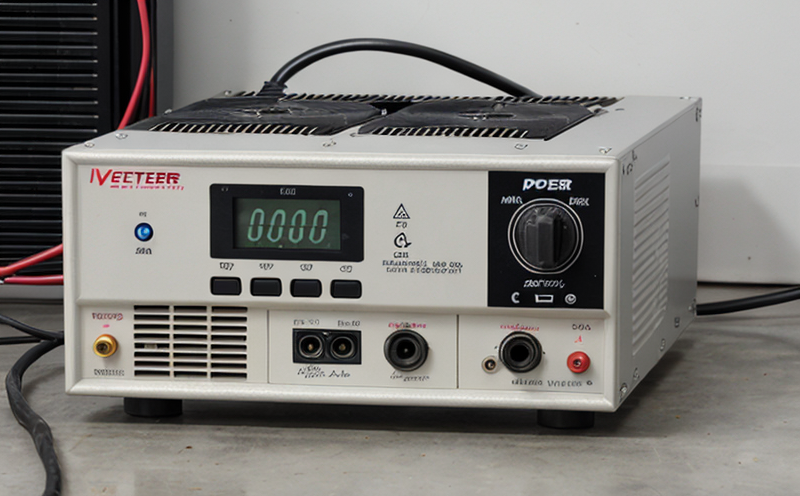ISO 15118 Communication Testing for Smart Charging Inverters
The ISO 15118 standard defines the communication protocols and procedures between electric vehicles (EVs) and charging stations. Compliance with this standard is crucial as it ensures seamless, secure, and efficient smart charging of EVs, which in turn contributes to enhanced user experience and safety.
The testing service focuses on verifying that smart inverters adhere strictly to ISO 15118 communication protocols. This includes checking for interoperability, security, and performance. The tests ensure that the device can communicate effectively with various types of charging stations, including those that may be updated or added in future years.
The testing process involves several stages, starting from pre-test assessments to post-test report generation. Pre-tests include verifying hardware compatibility and software configurations. During the testing phase, the focus is on ensuring that the smart inverter can successfully communicate with different charging stations while adhering to the specified communication protocols. This ensures that the device functions correctly under a variety of conditions.
The testing apparatus used for this service includes advanced simulation tools that mimic real-world scenarios encountered during EV charging. These tools allow us to simulate various charging situations, such as full charge cycles, partial charges, and emergency shutdowns. The use of these tools ensures accurate and reliable results.
Acceptance criteria for ISO 15118 communication testing are stringent and are based on international standards, including ISO 15118 itself. These tests ensure that the smart inverter meets not only the basic requirements but also the advanced features expected from modern charging solutions.
The importance of this service cannot be overstated, as it plays a critical role in promoting widespread adoption and usage of electric vehicles. By ensuring compliance with ISO 15118 standards, we contribute to the development of a robust smart grid infrastructure that supports sustainable energy consumption practices.
Our testing laboratory is equipped with state-of-the-art facilities designed specifically for this type of testing. Our team of experts has extensive experience in this field and uses cutting-edge technology to deliver accurate and reliable test results. This allows us to provide clients with the confidence they need when it comes to their product's compliance with ISO 15118 standards.
In summary, our ISO 15118 communication testing service is essential for ensuring that smart inverters are up-to-date with the latest standards and can operate seamlessly in a wide range of environments. This not only enhances user experience but also supports broader efforts towards sustainability and efficient energy management.
International Acceptance and Recognition
The ISO 15118 standard is widely recognized across the global automotive industry as a key component in promoting interoperability between electric vehicles (EVs) and charging stations. Its adoption has been driven by the growing need for standardized communication protocols that ensure seamless, secure, and efficient smart charging.
Many countries have already implemented ISO 15118 compliance requirements for new vehicle models and charging infrastructure projects. For instance, the European Union has mandated compliance with this standard as part of its broader initiative to reduce greenhouse gas emissions from transport sectors. Similarly, in North America, several states are considering similar regulations.
The widespread adoption of ISO 15118 is expected to drive further innovation and investment into EV charging solutions worldwide. By ensuring that smart inverters comply with these standards, manufacturers can tap into a growing market while also contributing to environmental goals set forth by governments around the world.
Our testing service supports this global trend by providing robust verification of ISO 15118 compliance across various regions and markets. This allows our clients to stay ahead of regulatory changes and ensure their products meet international standards before they reach the market.
Environmental and Sustainability Contributions
The ISO 15118 communication protocol is a significant step towards achieving more sustainable transportation systems. By promoting interoperability, security, and efficiency in EV charging, this standard helps reduce the environmental impact associated with traditional fossil fuel-based vehicles.
One of the key benefits of adhering to ISO 15118 standards is reduced energy consumption during charging processes. The protocol allows for better management of available power resources, minimizing waste and maximizing the utility of renewable energy sources. This leads to lower carbon footprints associated with EV charging infrastructure.
In addition to reducing emissions, compliance with ISO 15118 also supports other sustainability initiatives such as smart grid integration and demand response programs. These efforts help optimize the use of existing electrical networks, further enhancing their efficiency and reliability.
Our testing service plays an important role in supporting these broader environmental goals by ensuring that smart inverters are capable of operating efficiently within a smart grid framework. By providing accurate and reliable test results, we enable our clients to develop products that contribute positively to both the environment and society at large.
Use Cases and Application Examples
| Use Case | Description |
|---|---|
| Emergency Shutdown | In the event of a power outage or other emergency situation, the smart inverter should be able to communicate with the charging station and initiate an orderly shutdown process. |
| Partial Charging | The device must support partial charging scenarios where EVs only need enough electricity for their immediate needs. This reduces overall power consumption and strain on the grid. |
| Full Charge Cycle | The smart inverter should also be able to handle full charge cycles, ensuring that vehicles are fully recharged when needed. |
| Battery Management Systems Integration | The device must integrate seamlessly with battery management systems (BMS) within the vehicle to optimize charging performance and extend battery life. |
- Ensuring compatibility with various charging stations, including Level 2 chargers and DC fast-chargers.
- Testing for secure communications between EVs and charging infrastructure to prevent unauthorized access or tampering.
- Evaluating the performance of smart inverters under different environmental conditions such as temperature fluctuations.





